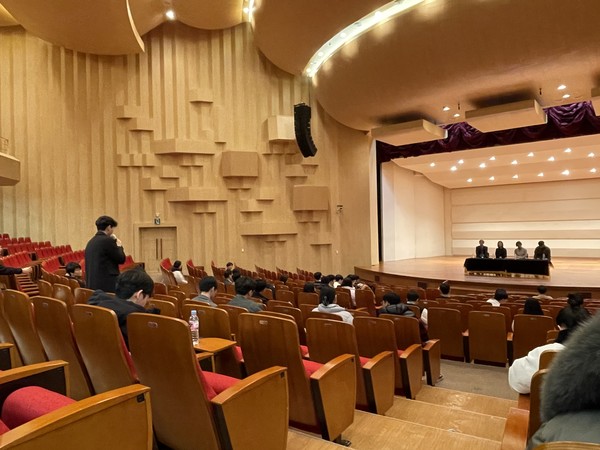To address the incident during the most recent commencement exercises, an open forum was held on February 26 at the Auditorium (E15). The forum, organized by the Undergraduate Association (UA) Emergency Response Committee <NON-STOP>, aimed to discuss the events and implications of the security measures taken during President Yoon Suk Yeol's address, which led to the forceful removal of a protesting student from the ceremony on February 16. Only students verified with their ID were allowed entry to the event that was announced via email.

A clip of the incident swiftly gained traction in media and online communities. It depicted a graduating student, later identified as a spokesperson of the Green Justice Party, being physically removed by the presidential security personnel while vocally protesting the government's decision to cut research funding by 15%, the first R&D budget cut in 33 years. Notably, some of the security personnel involved were seen to be disguised in graduation gowns, adding a layer of complexity to the situation and raising the eyebrows of many.
The forum was joined by around 40 attendees, including both undergraduate and graduate students, the chairperson of the Emergency Response Committee, and several key university officials including Provost and Executive Vice President Gyun Min Lee, outgoing Dean of Student Affairs & Policy and Student Life Sujin Lee, incoming Dean of Student Affairs & Policy Young-chul Ghim, and incoming Dean of Student Life Yeonseung Chung.
The meeting was divided into two parts: a presentation by the university addressing the specifics of the incident and a subsequent open discussion period. The participants were not asked to identify themselves and their affiliations to encourage free expression of opinions. Upon agreement, the meeting only ended after all of the students’ questions were addressed.
Participants raised a broad range of topics, from the lack of immediate response by the university to the incident, to the broader repercussions of the government's decision to slash research and development budgets. A significant portion of the discussion also centered around the need for the university to more vigorously defend students’ interests and ensure a conducive environment for free speech and expression.
Students viewed the issue as a human rights violation and questioned the legitimacy of the excessive security action. They also expressed disappointment with the insufficient communication between the school and the student body after the incident. Many were also saddened by the fact that what was supposed to be a joyous occasion became a focal point of public controversy.
The administration’s stance on the matter, particularly their hesitance to issue a formal statement, was also heavily scrutinized by the participating students. In the administration’s defense, they stressed that the mixed opinion of the school community, specifically the lack of a majority vote among the faculty, made it difficult to issue a collective statement. Another issue they pointed out is the need to maintain a neutral political stance as a public institution, citing the political affiliation of the graduating student.
In response to questions regarding the security proceedings during the ceremony, the school officials explained that when the President attends an event, they are required to follow the protocol of the Presidential office and that there is no room to compromise. They also expressed regret regarding the lack of a real-time response. They explained that as the incident happened too suddenly, the present faculty was not able to judge the situation and take action. The administration was also asked about the police investigation that took place after the restriction of the protesting student. They explained that the police asked for the school's position on whether there was any disruption in the delivery of the graduation ceremony due to the student’s actions. They responded to the police that there was no disruption and that there was no reason to punish the student.
Numerous suggestions also emerged from the forum, particularly on improving communication between the student body and the administration. The university administration promised to establish more direct communication channels with the university's president through occasions such as town hall meetings. There was a collective call for the university to reinforce its commitment to upholding student rights and to ensure order for future graduation ceremonies.
The forum concluded with a pledge from the university's administration to conduct a thorough investigation into the incident and to maintain an open line of communication with the student body to address any lingering concerns. The administration also committed to sharing the results of their investigation with the student council and to take student feedback into account in future university planning and policy making.

